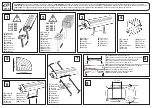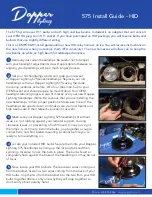
Development goals
Every customer expects good comfort,
good performance and fuel economy
from their car. This in turn, places a
demand for effective and efficient
technical solutions; to choose, as Vol-
vo sees it, the best solution for each
specific purpose.
The challenge for Volvo con-
sequently meant to combine a roomy
interior with a solid safety structure,
compact exterior dimensions and ef-
fective energy absorption with a pow-
ertrain combining comfort, per-
formance and energy efficiency.
A transverse installation of an in-
line engine is today accepted as the
best technical and most space efficient
solution. This is a solution already
chosen for the Volvo 400-series and
was on space, packaging and handling
grounds also chosen for the Volvo 850
GLT.
The development of the new engine
is the second step of Volvo's new
modular engine family, the N-series.
The first step was the in-line six
B6304F, which was introduced in the
Volvo 960 in August 1990.
The modular engines have several
identical components. The major com-
ponents are machined in a common
transfer line, in a highly rational and
most cost-effective manufacturing
process.
The normal order of priority for en-
gine properties during design and de-
velopment within Volvo Car Corpora-
tion is the following:
- Exhaust emissions
- Fuel economy
- Driving pleasure
- Performance
The interactions between these
four main properties are very strong
and it is very difficult to alter one
without affecting the others.
Since a lot of emphasis during the
development of the Volvo 850 was
put on performance and driving
pleasure, this had its effect on the in-
ternal relationships of the four prop-
erties given priority. In order to meet
the performance requirements with
maintained fuel economy, a variable
induction system was introduced.
This made it possible to combine
high torque at low engine speeds with
high power at high engine speeds,
keeping fuel consumption optimized.
Big efforts have also been made to
reduce noise and vibrations. There-
fore the best ignition timing has not
only been determined by emissions,
fuel consumption, performance and
driveability but also by its effect on
noise and vibrations. Comfort is a
property that also has been given
high priority when developing the en-
gine for the Volvo 850.
Another example of this is throb-
bing and sawing powertrain motions
that goes with a transverse engine in-
stallation and front wheel drive. Such
motions have been minimized by
electronic dashpot functions and oth-
er features of the engine management
systems.

































